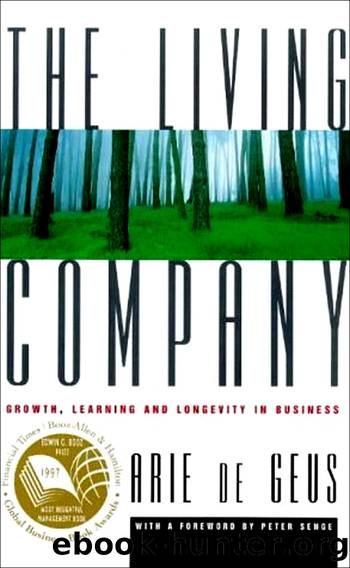The Living Company by Arie de Geus

Author:Arie de Geus
Language: eng
Format: epub
Publisher: Nicholas Brealey Publishing
Published: 1999-07-14T16:00:00+00:00
Common values
Is there an alternative to killing the diversity of a company or beating the organization into hierarchical submission? In other words, what keeps the members of a living, river company in tune with each other?
They subscribe to a set of common values. They believe that the goals of the company will help them to achieve their own individual goals. Or, as William Stern put it:
It is important that the individual goals of the substructures are harmonious with and best served by the goals of the higher level system. In crude terms, this means that the overarching structure should make it clear and prove to its components down to the individual human beings, that their survival and their self actualization are best served by working together towards the survival and the development of the whole.2
This basic ‘egoistic’ principle is often misunderstood in business governance. It means that anyone running a large, complex institution—such as a group of subsidiary companies, a set of joint ventures or a company composed of business units—cannot simply dominate individual self-interest through the exercise of power. As Stern might put it, each entity within a company, from the subsidiaries to the business units to the departments to the individuals, is a persona in its own right. Each of these personæ exists in constant exchange and dialogue with the world around it. This means that each is continually testing its own values, through introception, against those of the larger group. Governance is a matter of assuring that the goals of the subsidiary companies and of each employee are harmonious with the goals of the larger whole—and vice versa.
A key governance issue, for example, involves the perennial problem of the salaries paid to top managers. Press accounts often excoriate CEOs and senior managers for making too many times the salary of people at the lower end of the hierarchy. This is a problem, but not for outsiders. It is a critical question for a company’s introception about its own values.
Any executive’s remuneration is exaggerated if it is experienced by the rest of the work community as exaggerated. One work community might be quite prepared to pay its top people fairly high amounts; that would be in harmony with the company’s internal realities. Another work community would find high salaries for senior managers unpalatable. The standard for any pay scale is an internal standard. You may be my boss today, but I’m the next generation. I know I’ll be the boss tomorrow, or one of my peers will.
In short, the goals of each member must be harmonized with the goals of the whole community. The whole and the parts must understand that the interests of each are best served by staying together.
Many people seem to want this form of cohesion. It’s what they’re describing when they say, for example, ‘I spend eight hours or more every day at work. It’s a dominant part of my life. And I want it to fit with the rest of my life!’
Our corporate
Download
This site does not store any files on its server. We only index and link to content provided by other sites. Please contact the content providers to delete copyright contents if any and email us, we'll remove relevant links or contents immediately.
| Consulting | Entrepreneurship |
| Franchises | Home Based |
| Marketing | New Business Enterprises |
| Nonprofit Organizations & Charities |
Pioneering Portfolio Management by David F. Swensen(5606)
Zero to One by Peter Thiel(4824)
Man-made Catastrophes and Risk Information Concealment by Dmitry Chernov & Didier Sornette(4737)
The Motivation Myth by Jeff Haden(4528)
The Miracle Morning by Hal Elrod(3911)
Elon Musk by Ashlee Vance(3455)
The Art of Persistence: Stop Quitting, Ignore Shiny Objects and Climb Your Way to Success by Michal Stawicki(3367)
Unlabel: Selling You Without Selling Out by Marc Ecko(2981)
Urban Outlaw by Magnus Walker(2950)
Delivering Happiness by Tony Hsieh(2922)
Purple Cow by Seth Godin(2698)
Mastering Bitcoin: Programming the Open Blockchain by Andreas M. Antonopoulos(2512)
The Content Trap by Bharat Anand(2493)
The Marketing Plan Handbook: Develop Big-Picture Marketing Plans for Pennies on the Dollar by Robert W. Bly(2414)
The Power of Broke by Daymond John(2376)
The Airbnb Story by Leigh Gallagher(2371)
Applied Empathy by Michael Ventura(2330)
Radical Candor by Kim Scott(2216)
Keep Going by Austin Kleon(2161)
